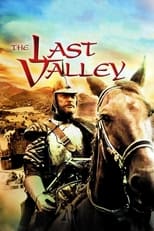tmdb28039023
Sep 8, 2022
6/10
The Last Valley is set in the German countryside during the Thirty Years' War (1618-1648), a conflict originally motivated by religious differences that soon became mainly political (if there’s any difference at all).
Vogel (Omar Sharif), a former teacher constantly running from the ravages of war, discovers a village hidden in an idyllic valley; unfortunately for him, the Captain (Michael Caine) and his band of mercenaries — which includes Lutherans, Calvinists, and Anabaptists (“pagans”, “blasphemers,” “Satan worshipers”, and “worse;” i.e., Catholics) — arrive at the same time.
To save himself, and the village, from looting, pillaging, and rape by the soldiers, Vogel persuades the Captain to camp there and forget about war, famine, and, of course, the plague, for the winter. Using Vogel as a mediator, the Captain brokers a truce with the population, agreeing to protect the people of the valley in exchange for food, shelter, and concubines; in a scene brimming with religious satire, the Captain manipulates the local Catholic priest into give, or better yet, sell the chosen women a “public blessing ... full remission of past and future sins” (I’m reminded me of the bishop in The Baby of Mâcon preemptively pardoning hundreds of rapists).
Another great scene belongs to Sharif; the Captain has moved a conspicuous “Our Lady” altar to a less conspicuous location in the valley, incurring the wrath of the aforementioned priest and other Catholics (including, ironically, those under the Captain's orders).
In order to preserve the fragile peace, Vogel comes up with a story about a dream he had the night before in which “a regiment of soldiers came riding under a full moon. They were huge and wicked, and they faced the altar. But as they watched, the shrine disappeared. So the soldiers went on their way to Rheinfelden and never came back."
Writer/director James Clavell provides the Captain and Vogel with romantic interests, but the only relationship that matters is the love/hate bromance between the cynical military man and the scrupulous ex-teacher. On the other hand, Clavell puts the Tyrolean locations to great use; the titular valley, photographed in all its splendor by John Wilcox, delivers in spades the Arcadia that the script promises.
